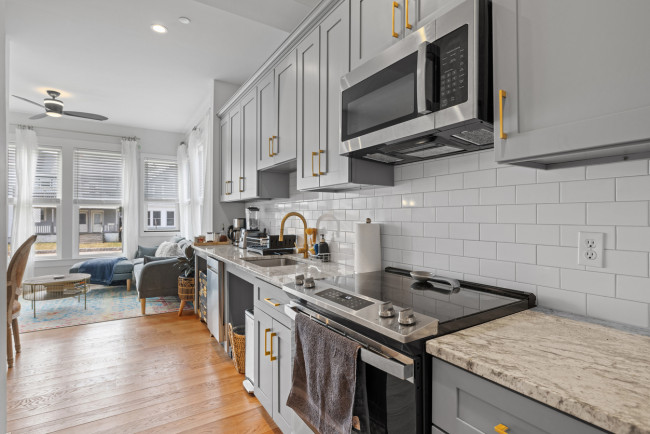My cabinets are falling apart and my landlord says I'll owe a contractor $7,000 to fix them. What are my rights?
- It's illegal to charge a rent-stabilized tenant for repairs without their prior consent
- For most market-rate apartments, the landlord is the one responsible for repairs

In most cases, repairs to your apartment are a landlord's responsibility and you should not be asked to pay $7,000 to a contractor.
m-gucci/iStock/Getty Images Plus via Getty Images
I’ve lived in the same NYC rental for 25 years and the cabinets have deteriorated over time. I was asked to pay $7,000 directly to a contractor to replace them. Shouldn’t this cost be absorbed by the landlord or rolled into my rent over several months? What are my rights here?
In a rent-stabilized apartment a landlord cannot charge a tenant for repairs and upgrades unless you agree in writing and even then, it would be a fraction of the cost and capped at $15,000, our experts say. Even in a deregulated or market-rate apartment, having a tenant pay for these types of repairs would be highly unusual but you would need to look at the lease to find out your obligation.
“You cannot charge a tenant for work that is the landlord’s responsibility,” says Sam Himmelstein, a partner at Himmelstein McConnell Gribben & Joseph who represents residential and commercial tenants and tenant associations. In all New York City apartments, a landlord has an obligation under the warranty of habitability to make sure conditions in the apartment aren't dangerous or hazardous.
Rent-stabilized tenants have added protections
As a rent-stabilized tenant, you are not entitled to upgrades to your apartment, but if you had good quality wood cabinets when you moved in, the landlord must maintain the prior level of service, says Steven Kirkpatrick, a partner at Romer Debbas.
In a rent-stabilized situation, the only way the cost of repairs or upgrades can be passed onto a tenant is by prior agreement in writing between the landlord and the tenant. In these circumstances the landlord of a rent-stabilized apartment can also only charge a small fraction of the cost of improvements to a tenant. This is outlined by tenant protections passed into law in 2019 by the Housing Stability and Tenant Protection Act. Even if the landlord did a major renovation, this cost would be capped at $15,000.
If the cabinets are so deteriorated that they need to be replaced and you don’t agree to pay, the landlord must still make the upgrades but without your contribution.
A possible scenario is that the rent-stabilized lease has a clause stating the tenant will pay for repairs and upgrades, but Himmelstein says this is likely void because landlords and tenants cannot agree to pay increases that are illegal under rent stabilization. “The lease cannot override the rent-stabilization laws,” he says.
It's very rare for market-rate tenants to be responsible for repairs
In a deregulated or market-rate apartment, your obligation to pay for repairs and upgrades would be governed by the lease or the terms of the tenancy. Kirkpatrick says it’s possible a lease may state tenants must make repairs, but it is very rare. “The standard scenario is that the landlord makes repairs,” he says. If there is no provision in the lease for the tenant to take on repairs then you should make no payments to the landlord or contractor for work done to the apartment. If the cabinets present a hazard, your landlord—under the warranty of habitability—is required to make repairs at their own expense.
In the uncommon situation there is a provision that makes the tenant responsible for repairs, it would need to be closely reviewed, Kirkpatrick says. “Does the tenant have to agree to the amount upfront? Who selects the cabinets? Those issues would presumably be addressed on some level,” he says. If the clause modifies your rights under the warranty of habitability, it would be void and unenforceable.
Alternations need to be agreed in advance with the landlord
One reminder if you are considering taking on cabinet repairs as a DIY project: Almost every lease has a clause saying a tenant cannot do alterations without the landlord's written consent. “Those clauses are enforceable,” Himmelstein says.
So, if you make substantial unauthorized changes to the apartment you may be served a notice to cure—that is, told to restore the apartment to its original condition. This might be possible with cosmetic work like painting but if you’ve ripped out and disposed of antique cabinet doors without a landlord's consent and cannot replace them, you could face eviction.
On the other hand, there is case law where a tenant was taken to housing court for replacing non-functioning cabinets, after requests for the repairs were repeatedly ignored by the landlord. Himmelstein says the landlord sued the tenant in a holdover case and the court held that, under those circumstances, the tenant was within their rights.
If your cabinets are so deteriorated they are falling off the wall, you can file a Housing Part action seeking an order for the landlord to fix and replace the cabinets. Himmelstein points out, if this level of deterioration is part of a pattern of neglect by the landlord, you could combine the HP action with a harassment charge and the landlord could be fined or ordered to pay damages.
You Might Also Like



























